Let's see if we have this straight. Until there was positive economic news to report, the poor economy during the Barack Obama administration was the fault of his predecessor, George W. Bush. Now that the economic recovery has moved from tepid to healthy during the administration of his successor, Donald J. Trump, Obama deserves the credit.
That's the current tale the national media is spinning.
Take an Associated Press article on the January employment report that was published in Saturday's Times Free Press, for example. Nowhere in the article, which heralded the addition of 200,000 jobs by U.S. employers and a growth in wages at the fastest pace in eight years, was Trump mentioned.
Indeed, the article told readers outgoing Federal Reserve Chairwoman Janet Yellen - appointed by Obama and sworn in only in 2014 - was largely responsible.
"The Fed's low-rate policies, including the measured pace of rate increases," stimulated "enough growth to bolster hiring and wages," it reported.
The economy also was bolstered, it said, by "strong consumer spending and global growth" and "nearly eight years of steady hiring."
As a coda to a paragraph on jobs, the article did report that "raises stemming from Republican tax cuts and minimum wage increases in 18 states also likely boosted pay last month."
The tax cuts aside for a moment, what it failed to mention was the morale boost the Trump presidency had on businesses over the last year.
Whatever one thinks of Obama's presidency, one would not think of it as pro-business. His administration's Affordable Care Act, myriad regulations and corporate handcuffs, in fact, worked to limit any growth during his two terms. The economy recovered from the Great Recession, as economies always do, but businesses felt stymied, afraid to grow, worried about what might be around the corner.
When Trump took office, the change was immediate. Companies announced hiring plans, manufacturers wanted to stay in the U.S. or return their work here, and businesses felt freer to offer raises.
Since Congress passed the tax bill in December, such good news has been constant. More hiring, salary increases and bonus announcements came from every segment of the economy. The stock market, which grew well under Obama, has hit record after record.
In January, the article said, average hourly pay increased nine cents to $26.74, which was up 2.9 percent from January of 2017. That bump, it noted, was the biggest gain since the recession ended eight years ago.
But credit Trump?
That's not in the DNA of most national media, which personally detests the outspoken, often crude, take-no-prisoners president.
So the aforementioned article, which ticked off 2017 transportation/warehousing pay increases of 3.4 percent, factory increases of 3.3 percent, leisure/hospitality firm increases of 3.5 percent and manager increases of 2.4 percent, warned that such growth could be a cause for concern.
Of the 84 occupations that job listing website Glassdoor tracks, restaurant cooks - the type of occupation experts said Trump policies would help the least - received the largest salary increase.
Notwithstanding such good news, the article said, "higher pay could help swell inflation and spur the Federal Reserve to quicken its pace of interest rate increases in the coming months."
Of course, economic analysts told us during the Obama administration that a continued lack of Federal Reserve increases would portend badly for the economy. But that was then. This is now.
Despite being Trump-less, the Associated Press article said most economists believe wage gains will keep rising, that employers are hiring more people on a permanent full-time basis and that the number of part-time workers who would prefer full-time jobs has fallen nearly 15 percent in the past year.
That last statistic alone is telling. During the Obama administration, as the recovery crept along, wages were flat and workers settled for part-time work, the president's officials said this was the new normal.
In June 2016, five months before the presidential election, Yellen - the same woman credited in the Associated Press article for the booming economy - said sluggish economic growth was the new normal, that a 2 percent annual growth could be expected as far as the eye could see (at least two years).
Similarly, Obama's 2013 budget noted, "In the 21st Century, real GDP growth in the United States is likely to be permanently slower than it was in earlier eras "
The reality was borne out in the ranking of the Obama administration as last (at 1.6 percent) among all post-World War II presidents in gross domestic product growth.
So what changed?
Nearly 63 million people who voted for Trump, warts and all, know what changed. Even if the national news media doesn't.
